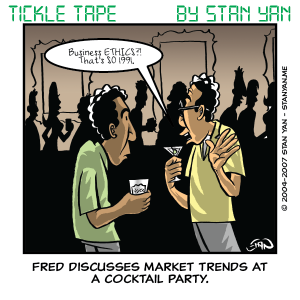Jim is a novice trader who is down $3,000 for the day. He thinks, “That’s a lot of cash. I could pay my living expenses for the entire month with that. I need to win it back right now.” Jim has made a fatal mistake: He has started to look at his profits and losses personally, and now his emotions are playing a role in his decision-making. He is now seeking “revenge” and such emotions have no place in trading. It is useful to cultivate a more objective, unemotional approach when examining profits and losses.
When it comes to managing your personal expenses, financial planners suggest using cash to pay all expenses rather than credit cards. When using credit cards, it’s easy to forget you are spending real money, and spending can get out of hand. Doling out the actual cash with each purchase, however, makes one see exactly how much money is being spent. It raises one’s awareness. The money is less abstract. It’s tangible. Watching dollars slip away provides a strong motivation to cut back. But when it comes to trading, it’s useful to do just the opposite: Look at the money as objectively and abstractly as possible, just as percentage points or ticks.
Psychological studies have established the impact of taking an objective perspective. Research psychologists have studied this topic in a variety of contexts. There are times when taking an objective approach is dangerous. It is well documented, for example, that when a person views another person in a less human and objective manner, he or she can more easily harm that person. The other person is no longer seen as a fellow human being but as an abstract entity. Creating such psychological distance, however, can help one cope with upsetting events. When participants view distressing films, showing a surgical procedure, for example, it is easier to fully process the information by objectifying the ongoing action.
When it comes to trading, an objective approach is useful. There are a few simple things you can do to maintain an objective view. Many say that when money is committed to trade and the risk and potential loss is experienced, “objectivity goes out the window.” Thus, anything one can do to minimize the feeling of risk and potential loss will nurture an objective mindset. First, it’s helpful to trade with money you can afford to lose. Trading is a profession where you should go in expecting to lose.
If you can’t afford to lose the money you trade, it will be difficult to maintain objectivity. Deep down, you will know that you are risking money you just can’t afford to lose in a worst-case scenario. Second, it is also crucial to managing your risk. By carefully managing risk on any single trade, you call tell yourself, “I’ve got little to worry about. I can afford to take the loss.” At first, you may have to consciously remind yourself of this fact (again, make sure it is a fact), but over time it will automatically be in the back of your mind. You will be calmer, and can more easily cultivate an objective mindset.
Finally, view profits and loses in an abstract framework. Rather than focusing on concrete dollar amounts, try to focus on percentages, or just abstract, theoretical numbers. Don’t think of the dollar amounts in terms of what can be purchased. Equating dollar amounts in terms of tangible terms, such as car payments or sought-after luxury items, will weaken your objective mindset. You’ll be more prone to experience elation from big wins and disappointment from losses. So cultivate an objective mindset. You’ll trade more profitably and consistently.


